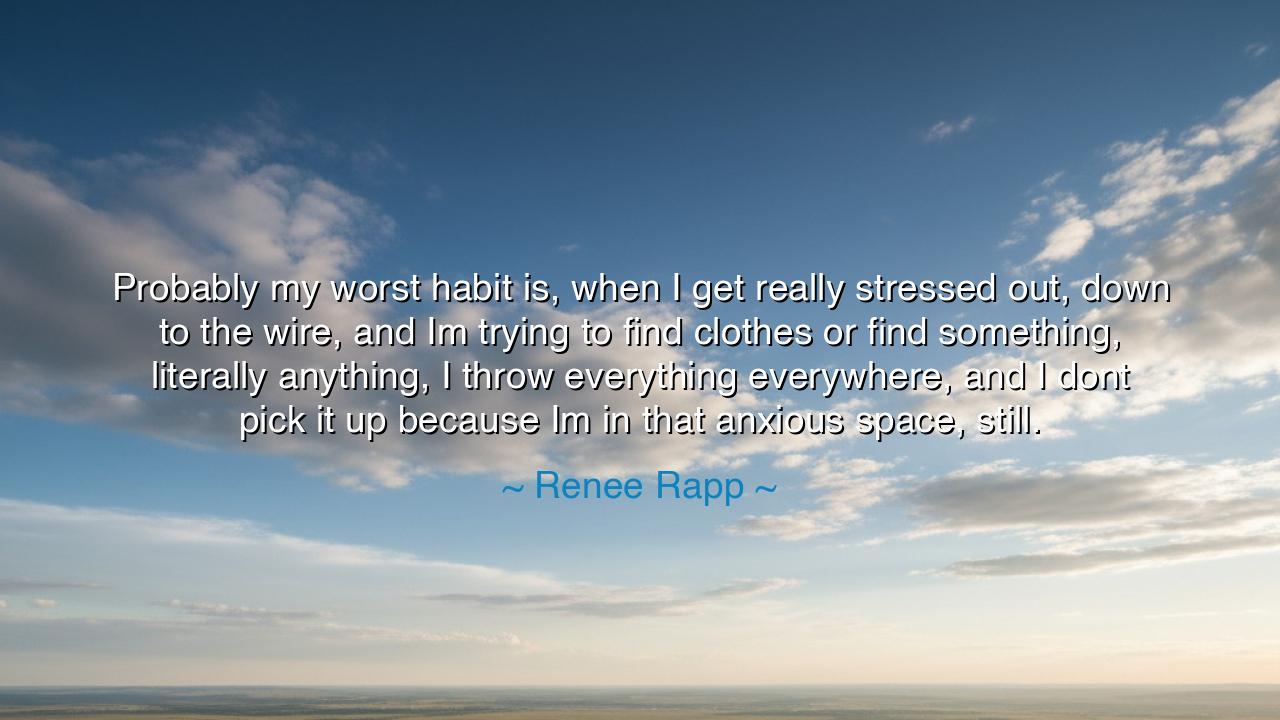
Probably my worst habit is, when I get really stressed out, down
Probably my worst habit is, when I get really stressed out, down to the wire, and Im trying to find clothes or find something, literally anything, I throw everything everywhere, and I dont pick it up because Im in that anxious space, still.






Hear the candid confession of Renee Rapp, who spoke not in grandeur but in honesty about the storms within: “Probably my worst habit is, when I get really stressed out, down to the wire, and I’m trying to find clothes or find something, literally anything, I throw everything everywhere, and I don’t pick it up because I’m in that anxious space, still.” Though these words seem simple, they reveal a truth known to all: that in moments of pressure, the outer world becomes a mirror of the inner, and chaos in the mind spills into chaos in the room.
The origin of this thought lies in the everyday battles of human life, not on battlefields or in courts of kings, but in the quiet struggles of the heart. Anxiety, that thief of stillness, drives the soul into restless patterns. When the mind is unsettled, even the body rebels—hands cast objects aside, order dissolves, and the surroundings reflect the storm within. Rapp’s words remind us that these small habits are not trivial; they are symbols of how the spirit wrestles with its burdens, how the unseen becomes seen.
The ancients themselves taught this lesson. The Stoic philosophers, like Epictetus, warned that man cannot hope to command the world if he cannot first command himself. Disorder in the chamber reveals disorder in the soul. Just as the disarray of Rapp’s scattered clothes reflects her anxious space, so too did the ancients believe that the discipline of the outward life strengthened the inward. The monk sweeping his floor was not cleaning dust alone, but quieting his mind, teaching himself to live in harmony with order.
History bears witness to this truth. Consider Napoleon Bonaparte, master of armies, who demanded order in all things—even in his tent while marching through storms of war. His maps, his clothing, his tools were meticulously placed, for he believed that a commander who allowed clutter in his private quarters would soon allow disorder in his ranks. Napoleon’s success was not in genius alone, but in the discipline that kept chaos at bay. Where Rapp confesses to be undone by stress, Napoleon sought to master it by ritual and control.
Yet there is no shame in Rapp’s honesty. To admit one’s habit is the first step to transforming it. Her words carry an unspoken heroism, for she dares to reveal what many conceal: that even the strong and the gifted are sometimes overwhelmed by stress, casting order aside in their haste. To acknowledge this openly is to teach others that struggle is universal, and that growth begins with recognition.
The lesson is clear: the outer reflects the inner. When your room is disordered, ask whether your heart is the same. When your space feels heavy with chaos, do not only tidy the garments on the floor—tidy the thoughts that weigh upon your mind. In doing so, you will find that order without begets order within, and that peace of soul can be nurtured by peace of surroundings.
Practical actions flow from this wisdom. When stress drives you into disarray, pause. Breathe. Do not abandon the mess, but tame it with small acts of discipline. Fold one garment, clear one corner, restore one piece of order, and let this become the seed of calm. Build rituals that anchor you—habits of preparation, of stillness, of tidying as you go. These are not trifles; they are weapons against the creeping storm of anxiety.
Thus, Renee Rapp’s words, though humble, carry the weight of eternal truth: that the anxious space within us demands our care, and that through attention to both the inner and outer world, we may rise above stress and find balance. Let each listener remember—when you find yourself throwing “everything everywhere”—that the path back to peace is not in surrendering to chaos, but in reclaiming order, one deliberate act at a time.






AAdministratorAdministrator
Welcome, honored guests. Please leave a comment, we will respond soon